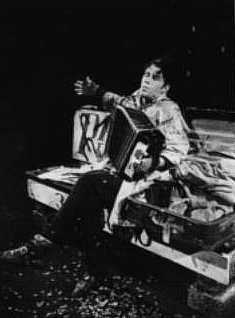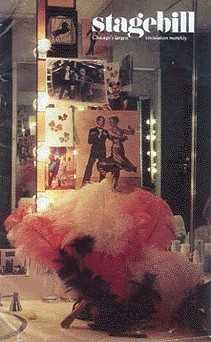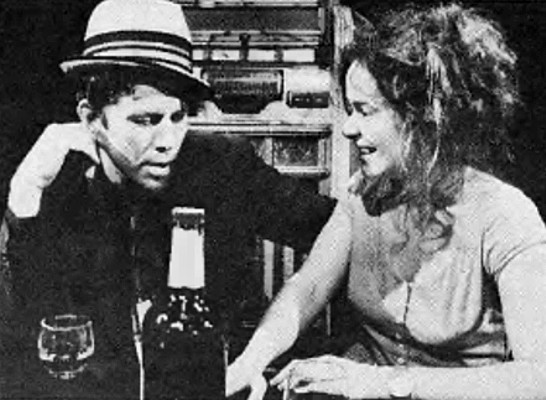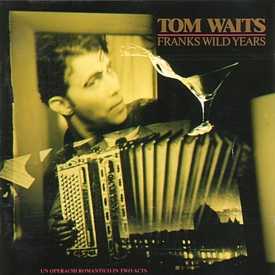Frank's Wild Years: Introduction
In September 1978 Waits had his movie debut in Sylvester Stallone's Paradise Alley as pianist Mumbles. It might have triggered his fascination with acting and the movies, cause a couple of months later he teamed up with Paul Hampton to work on a movie script to be called: "Why Is The Dream Always So Much Sweeter Than The Taste?"
Tom Waits (1987): "I just started working on the project in December [1978] when I got off the road. I'm working on it with a gentleman by the name of Paul Hampton who used to be Burt Baccarach's old songwriting partner; he used to write for Famous Music in New York during the '50s, writing for Gene Pitney and cats like that. And he is also an actor, and we're collaborating on this film script about a used car dealer in Southern California, and an old friend of his who are reunited on New Year's Eve. It's a nice story. It's about a guy who's a success at being a failure and a guy who's a failure at being a success."... "Actually we haven't got anyone to release the film yet. The whole thing's being written on spec. The characters are Jack Farley Fairchild, of Fairchild Dord. Torence, California, and Donald Fedore, his partner and side-kick. I never tried anything like this before. I don't find it at all easy. In fact, it's the hardest thing I've ever done... well, the most challenging anyway."(1)
The mysterious project would never be realized. It just didn't attract enough industry attention (and Waits' career would soon turn other ways) but a fragment from it, a scene called "Used Carlotta," turns up in Coppola's One From the Heart. It is tempting to assume Waits later used the script for his 1986 play Frank's Wild Years. Both scripts seem to have similar themes and characters. After Waits' debut in Paradise Alley, he appeared in several other movies: Wolfen (1981), The Stone Boy(1982), One from the Heart (1982), The Outsiders (1983), Rumble Fish (1983), The Cottonclub (1984). Working for Coppola's One From The Heart must have been an excellent opportunity for Waits to witness the dynamics of acting and directing. So in the early 1980's Waits was not only occupied with his music but he was also focused on acting and filming. It was therefore no surprise that Waits started working on his own theatre project. It seems he started thinking about this theatre project in 1983.
Tom Waits (1983): "This stage thing for me is a West Broadway musical revue for lack of a better description of it. It's gonna be kind of a musical sojourn but with more focus on the theatrical aspect of it rather than just a straight performance. It's gonna actually unfold, unravel like - or I'm going to unravel, I don't know which is gonna come first. I've been trying to get it finished so - at a theatre near you soon, Christmas time - not sure."(2)
Tom Waits: (1983) "Kinda follies, my own Kabuki Burlesque called Martini Plans or Bad Directions, haven't decided. See, by running a small theatre, if I want a blue light and an oversized cocktail glass and a red clock and a midget in a wet-suit, I can have it without having to send out, tuba, trombone, banjo, accordian, electric stick and an emcee with a pencil-thin mustache and a Mexican accent." A new start for Cecil Parkinson, I wonder, but suggest Pee Wee Marquet, fabled midget emcee from Birdland."(3)
That same year Waits released the album Swordfishtrombones with the hilarious Ken Nordine inspired monologue "Frank's Wild Years".
Tom Waits (1983): "Charles Bukowski had a story that essentially was saying that it's the little things that drive men mad. It's not the big things. It's not World War II. It's the broken shoe lace when there is no time left that sends men completely out their minds. So this is kind of in that spirit... I think there is a little bit of Frank in everybody."(4)
In 1984 Waits and Kathleen Waits-Brennan wrote the script for the play (at the same time as Rain Dogs was written). Frank Leroux, from Swordfishtrombones' "Frank's Wild Years" became the archetypal main character for the upcoming theatre play. Frank was renamed Frank O'Brien (Big Time video) and transformed a despondent and penniless accordian player with very Waitsian qualities. The script was finished in New York late 1985. It's not clear whether the script already had the finished songs. Rudimentary versions of the songs appeared on a demo cassette labeled: Island, 1985 (as mentioned by Barney Hoskyns in Lowside Of The Road 2009).
In 1980 Chicago's Steppenwolf Theatre Company had staged Lanford Wilson's Balm in Gilead (directed by John Malkovich). The soundtrack had music from Ricki Lee Jones, Tom Waits and Bruce Springsteen. As the production was remounted in 1984 in New York, Waits met Gary Sinise and Terry Kinney and John Malkovitch from Steppenwolf which led to them talking about a partnership for Waits' upcoming theatre project. Steppenwolf Theatre Company was going to produce the play planned for June 1986. Rehearsals began April 22 in Chicago. Kathleen Waits-Brennan was primarily responsible for the libretto and Waits himself was in charge of the music. Main character Frank was going to be played by Waits and the play was going to be directed by Terry Kinney.

Tom Waits as Frank O'Brien (20)
Waits and his wife Kathleen Brennan collaborated on the play as they had done on Swordfishtrombones and Rain Dogs. The pit musicians (some of the Rain Dogs group) were: Greg Cohen (bass, horns), Ralph Carney (saxes), Michael Blair (drums, marimba, glockenspiel), Bill Schimmel (accordion, keyboards) and Morris Tepper (guitar).
Bill Schimmel (2007): "We had an elaborate rehearsal process for about six weeks, working it out together in a workshop situation. We were doing the whole Brechtian thing and then breaking in the Vegas thing as well. We had to be ready to do fifteen bars of something that could have been right out of Vegas... She [Kathleen Brennan] was around a lot during the rehearsals, when it was on its feet. A lot of those words were her words and she wanted to make sure they were mounted properly."(23)
Bill Schimmel (2007): “In many ways we were very unlikely rock stars. None of us looked like rock stars and none of us acted like rock stars. But all of a sudden we're in this band and sort of becoming rock stars. Waits was inspirational throughout the rehearsals. When the band had worked up and taped an arrangement, Greg Cohen would hand a cassette to Waits, who'd come in after rehearsing with the Steppenwolf actors. Concerned that the music might stagnate through nightly repetition, Waits urged the musicians to make deliberate mistakes. He'd want more funny notes and he'd want tricky little train wrecks in the textures. If we were getting a little too tight, he would be a little bit wary about that. He always wanted a bit of a rub in everything, and when we got that right he seemed to be relatively satisfied."(23)
The play could be about "following ones dream", or in Waits's words...
Tom Waits (1985): "This is the tale of an unfortunate American psychopath who leaves a small town called Rainville to seek his fame and fortune, ends up in Las Vegas. It's got lots of laughs and songs, something for the whole family, opening soon at a theatre near you."(5)
Tom Waits (1985): "It actually starts out with Frank at the end of his rope, despondent, penniless, on a park bench in East St. Louis in a snowstorm, having a going-out-of-business sale on the whole last ten years of his life. Like the guys around here on Houston Street with a little towel on the sidewalk, some books, some silverware, a radio that doesn't work, maybe a Julie London album. Then he falls asleep and dreams his way back home. I've been saying that it's a cross between "Eraserhead" and "It's a Wonderful Life".(6)
Tom Waits (1987): "It's really, simply enough, the story of a guy from a small town who goes out to seek his fame and fortune; a standard odyssey. Eventually, what happens is that the story opens on a park bench in East St. Louis. Frank is despondent, penniless, and he dreams his way back home to the saloon where he began. He's thinking he's only moments from freezing, then wakes up, to his surprise, in the saloon. He's given um...a ticket home, and there he tells the story of his success. But he stops in the middle of it, and tells the real story. He's no hero, he is no champion; wasn't what he says he was. He was really a guy who stepped on every bucket on the road. His friends kind of pull him out of it, and tell him he's got plenty to live for. In the end, he wakes up on the bench, ready to start again."(7)
Tom Waits (1987): "It's the story of a guy from a small town who goes out to seek fame and fortune, but he steps on every bucket in the road. Frank's no champion. We start him off on a park bench in East St. Louis - despondent, penniless, freezing - but he dreams his way back to the saloon where he began.' As he explains, his hands move in carny's misterioso. Any straight explanation presents problems to the Waits persona. It's like watching some knock-nutty pug still indelibly inked as The Kid trying to pick up some chump-change from the canvas in six-ounce Everlast gloves. 'Well, uh, all of Frank's shortcomings rise up before him, right in the middle of him bragging in the bar."(8)
Tom Waits (1985): "It's a story about failed dreams, about an accordian player from a small California town called Rainville who goes off to seek fame and fortune and ends up hoist on his own petard, as they say."... I would describe it as a cross between Eraserhead and It's A Wonderful Life. It's bent and misshapen and tawdry and warm and... something for all the family... Frank goes to Las Vegas and becomes the spokesman for an all-night clothing store. He wins a talent contest and some money on the crap tables, but then he gets rolled by a cigarette girl, and - despondent and penniless - he finds an accordian in a trashcan, and one thing leads to another, and before you know it he's onstage. "Y'see, when he was a kid, Frank's parents ran a funeral parlour, and while his mother did hair and makeup for passengers, Frank played accordian. So he'd already started a career in showbiz as a child."(9)
Frank O'Brien: What can you say about Frank that hasn't already been written? Quite a guy. Grew up in a bird's eye frozen, oven-ready, rural American town where Bing, Bob, Dean, Wayne & Jerry are considered major constellations. Frank, mistakenly, thinks he can stuff himself into their shorts and present himself to an adoring world. He is a combination of Will Rogers and Mark Twain, playing accordian -- but without the wisdom they possessed. (He'll get his). He has a poet's heart and a boy's sense of wonder with the world. A legend in Rainville since he burned his house down and took off for the Big Time.(10)
Apparently the play was first planned to be staged in New York City, but somehow things didn't work out. Also Waits had been discussing possibilities to do the project with Robert Wilson. They had met in New York City (December, 1984) after Waits had seen "Einstein On The Beach" at the Brooklyn Academy of Music. But at that moment the collaboration didn't work out yet.
Tom Waits (1985): "The ritual around the theatre here [New York] is very well-established, and if you're comin' in from some other place, well, you wait for a table. "It's a hard city, y'know, you have to be on your toes... When I arrived, I actually had a cab-driver say, If yer can make it here, yer can make it anywhere, jus' like Frank said..." (11)
Tom Waits (1999): "First person we approached was Robert Wilson, and he didn't know what to make of it. Of course, later I came to work with him on The Black Rider and Alice in Wonderland."(22)
Tom Waits (2000): "We [Robert Wilson/ Tom Waits] met in New York City. My wife and I had written a play called "Frank's Wild Years". We asked Bob if he would direct the play, and one thing led to another. We didn't actually do that project, but we went on ultimately to do two other projects together. We did "The Black Rider" and "Alice", both with the Thalia Theatre."(21)
In 1985 it was decided Steppenwolf Company was going to stage the play at Chicago's Briar Street Theatre. For the rehearsals and the 2 month run, the Waits family moved to Chicago. In true Waitsian fashion the production was subject to all kinds of last minute changes.
Jay S. Jacobs (2000): "Terry Kinney was set to direct Frank's Wild Years, but just a few weeks before it was scheduled to open, Kinney resigned (or was fired) over creative differences with Waits. Steppenwolf's head was actor Gary Sinise (who would later win an Oscar nomination for his supporting role in Forrest Gump and turn in strong performances in Apollo 13, Mission to Mars, Ransom, and Of Mice and Men). Sinise stepped into the breach and became Frank's director. There was some talk of retooling the production - building new stage sets - but by this point both time and money were in short supply. Waits remained calm. He told O' Donohue he felt that such turmoil was "normal. Sometimes the spark comes from a conflict of ideas. It's just wood and lights and people walking around until you somehow bang up against something, and something breaks, and something sparks, and something catches and then it has a life. Until then it's just on the page."(12)
Stephen B. Eich (Steppenwolf's managing director, 1986): "It wasn't as dramatic as some people would like to make it out to be. In the vaguest sense of the word, they call it artistic differences. We reached a point in the rehearsal process where Terry realized what he wanted to do with the show was different what Tom wanted to do with the show. Since Tom was new with this, we weren't sure if Tom could explain specifically where he was having problems or where Terry was having problems. It reached a point of incompatibility. So Terry thought in the best interests of the company and the project that he should step aside."(24)
On June 10, 1986 Steppenwolf performed a press preview for the play and on June 17, 1986 the play had its world premiere. The play ran for 2 months (June - July, 1986).

Frank's Wild Years Steppenwolf play bill (cover)
FRANK'S WILD YEARS(13)
by Tom Waits and Kathleen Brennan
directed by Gary Sinise
June - July 1986
CAST
Randall Arney*
Michael Blair
Elizabeth Bracco
Ralph Carney
Keithen Carter
Greg Cohen
Gary Cole*
Michael Fosberg
Moira Harris*
Leslie Holland
Tom Irwin*
Scott McClelland
Dave McConnell
Jodie Markell
Rondi Reed*
Peggy Roeder
William Schimmel
Moris Tepper
Vince Viverito
Tom Waits
Alan Wilder*
Richard Winters
*Steppenwolf ensemble member
set design Kevin Rigdon
lighting design Kevin Rigdon
costume design Erin Quigley
sound design Bob Gravenor
musical director Greg Cohen
incidental trickery devised by Teller
choreography Robert Wells
production stage manager Douglas Bryan Bean
ENSEMBLE
Michael Blair, Elizabeth Bracco, Ralph Carney, Keithen Carter, Greg Cohen, Michael Fosberg, Leslie Holland, Scott McLelland, Dave McConnell, Jodie Markell, Rondi Reed, Peggy Roeder, William Schimmel, Morris Tepper, Richard Winters.

Franks Wild Years (Tom Waits and Moira Harris)(19)
There are different stories about how successful the play has been. Performances were all sold out, but the play received "mixed reviews" as they say.
Jay S. Jacobs (2000): "... the play remained in a state of flux; they tinkered with it constantly, even during its run. The reviews were decent, but there were no raves."(14)
Tom Waits (1986): "Well, people say a lot of things. A review, essentially, is just one man's opinion, someone who came to the show and either liked it or didn't like it. That's all. So I don't know what to say except that you don't really rise or fall on the opinion of a critic. I think you have to put it all in the same hat you know. You don't do it for them and you don't allow them to discourage you one way or the other."(15)
Tom Waits (1987): ''I just didn't have the time to do the work that the play would have needed... We would have had to have taken it someplace else first before New York, and the chain just seemed too long and involved. ''But doing the play was a great experience for Kathleen and myself... It was great, living in Chicago. I miss it."(16)
Tom Waits (1999): "You have to be a little foolish to do something because a play takes a lot of energy- emotionally, financially. And the other thing is that it only lives when you're in it. But Steppenwolf was the right way to go."(22)
In 1987 Waits described working with Steppenwolf as "A positive experience... They're like a garage band. Three Chord theatre. Turn it up loud and see what happens."(17) After the theatre play Waits went in the studio and recorded the songs from the play to be released on the 1987 album Franks Wild Years (Island, August 1987). In October, 1987 Waits went on tour again (Marc Ribot, Michael Blair, Greg Cohen, Ralph Carney and William Schimmel) promoting the album. This tour resulted in Waits' next (live) album Big Time and its accompanying video (Big Time, 1988).
Rainville. Hardly ever did rain though, rain that is. It was nowhere. Railroad tracks ran up the back of the state like stitches. Telephone lines slashed the orange dawns like a wrecked ship's rigging... and when it rained the whole town went mad. Dogs ran wild in the streets. Frank was squeezed between scrap iron places and radiator repair shops... Rainville, good place to dream yourself away from. When the trains thundered past the backyard fence, bound for Oxnard, Lompoc, Gila Bend, Stanfield and parts south where the wind blew big, Frank would count the cars and make a wish just like he did when he was a kid... At least something was getting out of town alive... One moonlit night Frank packed up his accordion and said Blow Wind Blow Wherever You May Go... Cause I'm Going Straight To The Top... Up Where The Air Is Fresh And Clean.(Franks Wild Years linernotes, 1987)

Frank's Wild Years, 1987
(P) & � 1987 Island Records Ltd. 422-842 357-2
- Hang on St. Christopher
- Straight to the top (rhumba)
- Blow, wind blow
- Temptation
- Innocent when you dream (barroom)
- I'll be gone
- Yesterday is here
- Please wake me up
- Frank's theme
- More than rain
- Way down in the hole
- Straight to the top (Vegas)
- I'll take New York
- Telephone call from Istanbul
- Cold, cold, ground
- Train song
- Innocent when you dream ('78)
It seems that in 1987 there had also been talk about Waits and Jim Jarmusch collaborating on a screenplay for Frank's Wild Years, but it unravelled. In retrospect one wonders what this whole theatre experience did to Waits. He must have had "great expectations" starting in 1979 with the "Why Is The Dream Always So Much Sweeter Than The Taste?" project. It looks as if it was a bumpy ride and somehow things didn't turn out as Waits had wished they would. Since its original staging the play has never been performed again, and official sources confirm that, at the moment, Waits doesn't want the play to be staged ever again...
And one last mystery to be solved:
Interviewer (1987): Your father's name is Frank. Is that a coincidence?
Tom Waits: "My dad asked me the same thing. Well, Frank did have his wild years. But this is not verbatim. My dad's from Texas. His name is actually Jesse Frank, he's named after Jesse and Frank James. When you came to California in the 40s it was a lot hipper to be named Frankie, after Frank Sinatra, than to go with Jesse - they think you're from the dust bowl. "What did you get here in, a Model A?" But no, Dad, it's not about you." (18)
Notes:
(1) Source: "From The Set Of Ironweed" New York Post (USA), by Rip Rense/ Franks Wild Years tourbook, 1987. Date: early 1987
(2) Source: "Swordfishtrombones Interview" (interviewer's tape). Transcription by Gary Tausch. Date: 1983/ 1984
(3) Source: "Tom Waits For No Man" Melody Maker, by Brian Case. Date: October 29, 1983
(4) Source: "Tom Waits - Swordfishtrombones. Island Promo Interview". Transcription by Risto Etelaaho. Date: September, 1983
(5) Source: "Rain Dogs Island Promo Tape" Ttaped comments on songs as sent to radio stations. Transcription by Gary Tausch. Date: late 1985
(6) Source: "Tom Waits For No Man" Spin magazine (USA), by Glenn O'Brien. Date: November, 1985
(7) Source: "From The Set Of Ironweed" New York Post (USA), by Rip Rense. Edited version reprinted in Franks Wild Years tourbook, 1987. Date: early 1987.
(8) Source: "Worth The Waits" Time Out magazine (UK), by Brian Case. Date: November 11-18, 1987
(9) Source: The Marlowe Of The Ivories New Musical Express magazine (UK), by Barney Hoskyns. Date: May 25, 1985
(10) Source: Franks Wild Years Theatre program, 1986
(11) Source: The Marlowe Of The Ivories New Musical Express magazine (UK), by Barney Hoskyns. Date: May 25, 1985
(12) Source: "Wild Years: The Music and Myth of Tom Waits. Jay. S. Jacobs, 2000
(13) Source: Steppenwolf Company Official site
(14) Source: "Wild Years: The Music and Myth of Tom Waits. Jay. S. Jacobs, 2000
(15) Source: WXRT-FM Radio Interview Transcription by Gary Tausch. Date: Chicago. July 11, 1986
(16) Source: "Waits Measured: A Multifacted Singer Looks For New Directions" Chicago Tribune - Arts section (USA), by Lynn Van Matre. Transcription by Peter Dubsky. Date: October 18, 1987
(17) Source: "I Just Tell Stories For Money" New Musical Express magazine (UK), by Sean O'Hagan. Date: Travelers Cafe/ Los Angeles. November 14, 1987
(18) Source: "Tom Waits Is Flying Upside Down (On Purpose)" Musician magazine (USA), by Mark Rowland. Traveler's Cafe/ Los Angeles. October, 1987
(19) Source: "Rolling Stone" magazine, nr 481, 1986. Chicago, June 17- 22, 1986. Credits: unknown
(20) Source: unknown. Date: from the theatre play "Frank's Wild Years". Chicago, June 17- 22, 1986. Credits: unknown
(21) Source: Waits/ Wilson Woyzeck Promo Interview (Betty Nansen promo video?). Transcription by Keith A. Durrans Date: late, 2000
(22) Source: "Mojo Interview With Tom Waits". Mojo magazine (USA), by Barney Hoskyns. Date: Santa Rosa. April, 1999
(23) Source: Bill Schimmel interview December 12, 2007 as quoted in “Lowside Of The Road: A Life Of Tom Waits" by Barney Hoskyns. Faber/ Broadway, 2009
(24) Source: "Tom Waits in Chicago" (Dave Hoekstra archives) by Dave Hoekstra. July 8, 1986

